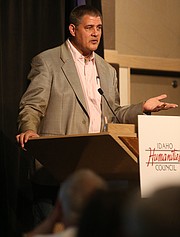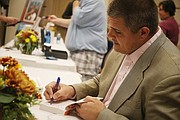Stories from a forbidden land
COEUR d’ALENE — In the shadow of the imposing Tower of Juche in Pyongyang, North Korea, is a place where North Koreans get to have a little fun — the Golden Lane Bowling Alley.
"Did you know they have bowling in Pyongyang?" Adam Johnson asked, gesturing to a projector screen showing the image of a retro bowling alley that's colorful on the inside and gray on the outside.
"There's one bowling alley in North Korea," he said, changing slides. "Here's a picture of just a person loving to bowl the way you love to bowl or someone else loves to bowl."
Johnson said the amazing thing about meeting North Korean defectors is not how very different their lives are from our own, "but how much you have in common."
"They want the same things out of life that you want," he said. "Opportunity, right? Security. Safety. Possibility. Those are things they risk their lives for. They’re also, I think, if I could generalize, some of the funniest people I’ve ever met."
The Pulitzer Prize-winning author delivered the main presentation Thursday evening during the 15th annual North Idaho Distinguished Humanities Lecture and Dinner at The Coeur d'Alene Resort.
The IHC evening was a recognition of the important role the humanities play in each person's life, learning and understanding of the world.
Johnson's speech was underscored by this concept as he spoke of interviewing North Korean defectors and presenting the stories from those who are completely cut off from the rest of the planet.
Johnson has spent years researching North Korea and has actually spent time in the isolated and militarized country. He discussed the bleak chances of survival that defectors face, including landmines to the south, mountain ranges impossible to climb and the potential for repatriation if caught in the wrong neighboring country.
He shared the story of Park Sang Hak, nicknamed "the Fireball," a brilliant North Korean man who was able to escape because of his elite status, but not without grave repercussions.
"When you escape from North Korea, the Chinese have a repatriation agreement, which means any farmer or factory worker or citizen can pick up a phone and say, 'Hey, there's a North Korean in my yard,' and China has an agreement to repatriate them back to North Korea," he said. "That's how women defectors become farmers’ wives. That's how defectors become sex workers or factory workers. They become trapped there because any human can send them back to their peril."
He said one of the things about the humanities and art is "that you can transmit across time and culture and space what it is to be a human being, and that's because all human beings are essentially the same."
"We have episodes in life that we all have in common — we're all born, we all fall in love, we all must lose things, we have initiations, we have to face things … All these moments in life, we all share them."
But in North Korea, Johnson said, they have one more thing in common.
"That is the day you discover that everything's a lie, you've been raised completely with propaganda."
IHC executive director David Pettyjohn said Johnson is considered "one of the leading voices of his generation."
Johnson has won several awards for his writing, including the National Book Award, the Dayton Literary Peace Prize and the California Book Award. He teaches creative writing at Stanford University.
The IHC lecture was attended by well more than 500 guests. Pettyjohn said the outpouring of support for the humanities in North Idaho is very much appreciated.
"It really shows that there is this absolute thirst for the opportunity to hear different viewpoints and perspectives and this desire to learn something new and hear a different voice."





